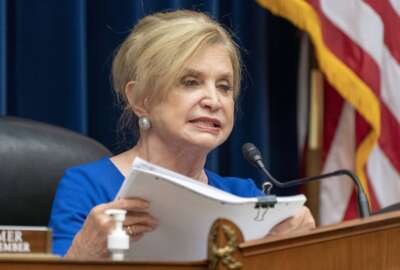VA set to grow its health care workforce with new pay incentives after Biden signs PACT Act
The Department of Veterans Affairs is looking to grow its health care workforce with new pay incentives and retain the in-demand employees it already has, now t...
Best listening experience is on Chrome, Firefox or Safari. Subscribe to Federal Drive’s daily audio interviews on Apple Podcasts or PodcastOne.
The Department of Veterans Affairs is looking to grow its health care workforce with new pay incentives and retain the in-demand employees it already has, now that a major VA health care bill has been signed into law.
President Joe Biden on Wednesday signed the Sergeant First Class Heath Robinson Honoring our Promise to Address Comprehensive Toxics (Honoring Our PACT) Act, after a long journey through Congress.
The PACT Act gives VA the resources it needs to staff up its health care workforce to treat approximately 3.5 million combat veterans exposed to toxic burn pits during their military service.
Biden, during a signing ceremony at the White House, said the “PACT Act is the least we can do for the countless men and women” who suffered toxic exposure while serving their country.
“It empowers the Department of Veterans Affairs to move quickly to determine service members’ illness and related military service to see if they qualify,” Biden said. “It means new facilities, improved care, more research and increased hiring and retention of health care workers treating veterans,” he added.
VA Secretary Denis McDonough said the “VA stands ready to implement PACT [Act] now.”
“For too long, too many veterans have gotten sick while fighting for our country — had to fight for their care here at home,” McDonough said at the signing ceremony.
The PACT Act outlines many provisions meant to make the VA a more attractive employer for health care workers in a competitive labor market.
It gives the VA up to $40 million a year to buy out the contracts of certain private-sector health care professionals in exchange for employment at rural VA facilities.
The bill also expands recruitment and retention bonuses for VA employees, including merit awards and pay incentives for employees that have a “high-demand skill or skill that is at a shortage.” The critical-skills pay incentive cannot exceed 25% of an employee’s base pay.
The bill also includes expedited hiring authority for college graduates into competitive service jobs.
The PACT Act also gives the VA 180 days to work with the Office of Personnel Management to establish qualifications for each human resources position within the VA, and to establish standardized performance metrics for its human resources positions.
The agency would also have 90 days to provide enhanced monitoring of the hiring and other human resources that happen at the local regional and national levels of the department.
The agency must also provide at least annual training to human resources professionals in the Veteran Health Administration. The bill gives the VA a year to submit to the House and Senate committees a plan on how it will recruit and retain HR employees.
The PACT Act also approves 31 additional leases for VA health care facilities across the country. The bill gives the VA a year to submit to the House and Senate committees a plan on how it will recruit and retain HR employees.
The PACT Act builds on the RAISE Act that Congress in March, which raises the pay caps for certain VA nurses and physician assistants. McDonough said about 10,000 nurses in July saw their salary increase under that legislation — that’s about one out of every nine VA nurses.
The PACT Act adds 23 burn pit and toxic exposure-related conditions to the VA’s list of service presumptions and creates a framework for the establishment of future presumptions of service connection related to toxic exposure
Biden said the legislation was personal to him, because he believes the brain cancer that killed his son, Beau Biden, was linked to burn pits he was exposed to during his military service.
“It was there all the time — toxic smoke, thick with poison spreading through the air and into the lungs of our troops. When they came home, many of the fittest and best warriors that we sent to war were not the same. Headaches, numbness, dizziness, cancer. My son Beau was one of them,” Biden said.
The PACT Act also gives VA resources to speed up claims processing for veteran benefits, and strengthens federal research on toxic exposure.
The VA said that the PACT Act is one of the largest health and benefit expansions in VA’s history, comparable in scale and impact to the 1991 Agent Orange Act.
Senate VA Committee Jon Tester (D-Mont.), who introduced the bill along with Ranking Member Jerry Moran (R-Kan.), said the bill becoming law “has been months — even decades — in the making.”
Moran said the bill “delivered on a promise made to our veterans that if someone serves in our military, we will take care of them and provide them with the benefits they have earned through their service.”
“For generations, toxic-exposed veterans have been left to fight our government to get the health care and benefits they have earned. I’m proud to say after today, this fight is over,” Tester said.
The Senate passed the bill, in an 86-11 vote, last week for a second and final time.
The Senate first passed the bill in June, and returned the bill to the House in July to fix technical drafting errors. Senate Republicans, however, temporarily blocked the PACT Act from passing over objections to making veteran health care mandatory spending, rather than discretionary spending in the annual appropriations process.
“This law is long overdue,” Biden said, “We finally got it done together.”
Copyright © 2024 Federal News Network. All rights reserved. This website is not intended for users located within the European Economic Area.
Jory Heckman is a reporter at Federal News Network covering U.S. Postal Service, IRS, big data and technology issues.
Follow @jheckmanWFED
Related Stories

The Veterans Affairs employee union helps torpedo a plan to even think about rearranging VA facilities.




